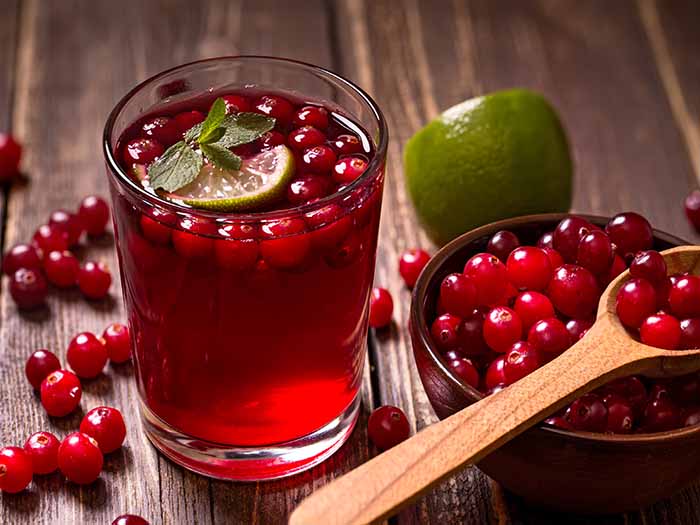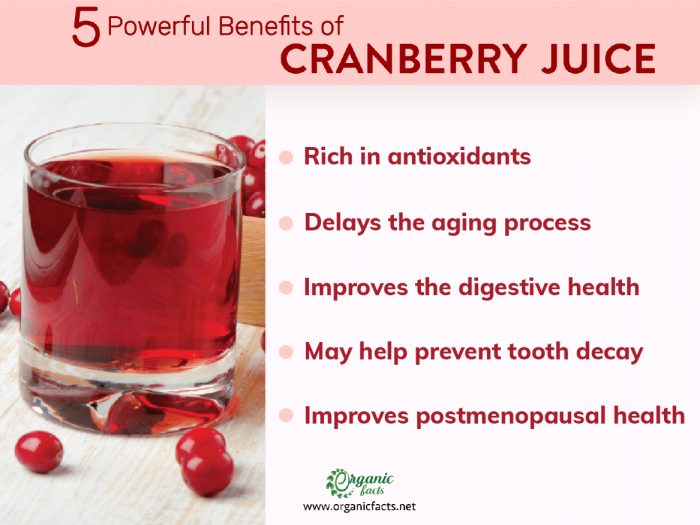Cranberry juice boasts numerous health perks, from combating age-related oxidative damage to preventing urinary tract infections and aiding in improving gut health. It’s a boon for post-menopausal health and shields against gum diseases from dental plaque.
Rich in phytonutrients, these plant compounds ward off various health concerns. Dive into the research on its efficacy, nutritional worth, and possible side effects.
What is Cranberry Juice?
Cranberry juice is made from cranberries, members of the Ericaceae family, one of the native fruits of North America. The Latin name for the cranberry plant is Vaccinium macrocarpon. [1]
Cranberry juice is used to make various sauces and cocktails. These cocktails are approximately 30 percent pure cranberry juice mixed with artificial sweeteners or fructose. About one liter of juice can be extracted from 1500 grams of fresh cranberries.
The fruit extract is also used to make medicines, gels, and tonics. Dried cranberries are also very healthy and can be enjoyed as a sweet addition to breakfast cereals, energy bars, granola bars, trail mixes, or baked goods like muffins.
Serving Size : Nutrient Value Water [g] 87.13 Energy 46 Energy [kJ] 194 Protein [g] 0.39 Total lipid (fat) [g] 0.13 Ash [g] 0.15 Carbohydrate, by difference [g] 12.2 Fiber, total dietary [g] 0.1 Sugars, total including NLEA [g] 12.1 Calcium, Ca [mg] 8 Iron, Fe [mg] 0.25 Magnesium, Mg [mg] 6 Phosphorus, P [mg] 13 Potassium, K [mg] 77 Sodium, Na [mg] 2 Zinc, Zn [mg] 0.1 Copper, Cu [mg] 0.06 Selenium, Se [µg] 0.1 Vitamin C, total ascorbic acid [mg] 9.3 Thiamin [mg] 0.01 Riboflavin [mg] 0.02 Niacin [mg] 0.09 Vitamin B-6 [mg] 0.05 Folate, total [µg] 1 Folate, food [µg] 1 Folate, DFE [µg] 1 Choline, total [mg] 3.3 Vitamin A, RAE [µg] 2 Carotene, beta [µg] 27 Vitamin A, IU [IU] 45 Lutein + zeaxanthin [µg] 68 Vitamin E (alpha-tocopherol) [mg] 1.2 Vitamin K (phylloquinone) [µg] 5.1 Fatty acids, total saturated [g] 0.01 16:0 [g] 0.01 18:0 [g] 0 Fatty acids, total monounsaturated [g] 0.02 16:1 [g] 0 18:1 [g] 0.02 Fatty acids, total polyunsaturated [g] 0.07 18:2 [g] 0.04 18:3 [g] 0.03 Sources include : USDA [2]
Nutrition
According to the USDA Nutrition Database [3], this juice has an abundant supply of antioxidants and vitamins. Cranberry juice is possibly rich in vitamin C and salicylic acid. In terms of minerals, it contains calcium, magnesium, iron, phosphorus, and potassium. It also contains B-vitamins like thiamin, riboflavin, niacin, vitamin B6, as well as vitamin E (alpha-tocopherol). Other nutrients in cranberry juice include sodium, zinc, vitamin A, folate, and vitamin K (phylloquinone).
By containing fewer calories per cup and high water content(87%), this juice fits very well within the dietary guidelines. It also has a tremendous amount of antioxidant capacity as compared with other vegetables and fruits, such as broccoli, spinach, or apples. One cup of cranberries measures a total of 8983 antioxidant capacity. For comparison, apples have 1500mg of antioxidant vitamin C.
Health Benefits
Cranberry juice has long been used as a remedy for various illnesses. The health benefits of cranberries may include the following:
Cranberry Juice for Possible Prevention of UTI (Urinary Tract Infections)
Cranberry juice has long been considered a potential preventive measure against UTIs. While the National Center for Complementary and Integrative Health acknowledges its preventive potential, they note that its efficacy as a treatment is debatable. [4]
In 2016, a study involving 147 women aged 65 and above in nursing homes revealed interesting findings. These women were given two cranberry capsules daily, equivalent to the proanthocyanidin content in 20 ounces of cranberry juice. After six months, there was a significant drop in bacteria levels in their urine. However, the frequency of UTIs remained unchanged throughout the year. [5]
Fast forward to 2023, a research review highlighted that cranberries are rich in antioxidants, specifically proanthocyanidins. These antioxidants hinder bacteria like Escherichia coli from attaching to bladder cells, thereby potentially reducing infection risk. [6]
Interestingly, a 2021 analysis of 23 studies found cranberry juice to be more effective than capsules or tablets in reducing UTIs. This might be attributed to the hydration benefits of consuming the juice. Additionally, a Canadian trial demonstrated that children aged 5 to 18 who consumed proanthocyanidin-rich cranberry juice experienced a 65% reduction in UTI risk. [7] [8]
However, some studies even suggest that cranberry juice doesn’t significantly alleviate symptoms in women with acute UTIs compared to water. [9]
Lastly, while many swear by cranberry juice as a home remedy for UTIs, the FDA cautions that the scientific backing for this claim is both limited and inconsistent, though a daily 8-ounce serving might help reduce recurrent UTI risks. [10]

Fresh cranberry juice with cranberries inside Photo Credit: Shutterstock
May Improve Heart Health
Cranberry juice, abundant in polyphenols, has shown potential in promoting heart health. A 2016 study in AgResearch Magazine revealed that participants who drank two glasses of cranberry juice daily exhibited reduced triglycerides, diastolic blood pressure, and glucose levels. However, this study’s credibility has been questioned since it was sponsored by a prominent cranberry juice brand. [11]
Contrastingly, a 2011 study by Arpita Basu from Oklahoma State University found that while 2 cups of low-calorie cranberry juice did decrease free radical activity, it didn’t significantly impact blood pressure, glucose, or C-reactive protein levels. [12]
May Improve Gut Health
Cranberry juice, believed to be rich in phytochemicals, can potentially enhance digestion and prevent peptic ulcers caused by the Helicobacter pylori (H. pylori) bacteria. Research from the University of Florida indicates that cranberries or their juice can inhibit H. pylori colonization in the stomach, safeguarding against intestinal inflammation. [13]
A 2016 study highlighted the positive influence of cranberry juice’s antioxidants on gut microbiota, including reducing inflammation and promoting beneficial bacteria. Fast forward to 2022, research involving 45 overweight adults showed that those consuming cranberry juice twice daily for six weeks saw improved inflammatory markers and an uptick in beneficial gut bacteria, likely due to the juice’s polyphenol antioxidants. This group also reported relief from constipation. [14] [15]
Furthermore, a report by Rummi Devi Saini in the International Journal of Biotechnology and Biochemistry emphasized that flavonoid-rich foods, such as cranberries, apples, and garlic, can diminish the risk of stomach disorders by curbing the growth of H. pylori. [16]
Might Improve Post-menopausal Health
Menopause often brings challenges like hot flashes, night sweats, vaginal dryness, and an elevated risk of UTIs. Cranberry juice might offer some relief. Research from Harvard Medical School suggests that cranberry juice can bolster heart health in postmenopausal women by aiding in cholesterol regulation. In a study, rats with ovaries removed (mimicking post-menopausal hormone reduction in women) showed that consistent cranberry intake led to a decrease in total cholesterol and other heart-related markers. [17]
Furthermore, a 2021 study in Food Frontiers examined cranberry juice’s impact on gut and vaginal microbiota in postmenopausal women. In this study, 23 women consumed either 8 oz of cranberry juice or a placebo daily for 15 days. The results indicated that cranberry juice significantly reduced the presence of harmful bacteria in women experiencing dysbiosis. [18]
May Fight Age-related Oxidative Damage
A 2011 study revealed that cranberries have enhanced antioxidant activity at lower pH levels. Interestingly, while the berries themselves are more potent antioxidants than the juice, the juice still offers notable benefits. Another study in the journal Age found that cranberry extract extended both the health span and lifespan of laboratory worms. US researchers also highlighted that cranberries combat oxidative damage, likely due to their rich content of antioxidants, proanthocyanidins, and vitamin C. [19] [20] [21]

Cranberry juice is used to make various sauces and cocktails.
May Promote Oral Health
Canadian research indicates that cranberry juice might be a boon for oral health, potentially preventing dental issues like cavities. The presence of proanthocyanidins in cranberries can deter harmful bacteria from adhering to teeth. This compound not only curbs acid production but also shields teeth from periodontal diseases by hindering plaque growth, as highlighted in the Journal of the Canadian Dental Association. [22]
A study in the Beverages journal further supports this, noting that drinks abundant in antimicrobial plant polyphenols, like cranberry juice, can suppress bacteria associated with plaque formation. [23]
While organic premium dried cranberries can bolster dental health by disrupting cavity-causing mechanisms, it’s essential to be wary of high sugar content and acidity in some store-bought juices. Opting for natural cranberry juice is always a wise choice. [24]
Side Effects of Cranberry Juice
Cranberries and cranberry juice offer a variety of health benefits, barring the few exceptions listed below:
- Effect with Warfarin consumption: Warfarin is an anticoagulant drug used as a blood thinner, and it lowers the chances of blood clots occurring in the body. These blood clots can further result in serious conditions like clots in the legs, lungs, and other parts of the body. Guidelines for warfarin clearly state that people who take the drug should be cautious regarding the intake of cranberry, as they are at high risk of bleeding. Excess consumption of cranberry juice is not recommended for these people as it may affect the efficacy and safety of warfarin in the body. In such cases, it is always advisable to regularly get your blood tested in order to consume the correct dose of the medication. [25]
- Aspirin allergy: Cranberries contain substantial quantities of salicylic acid, which is also present in aspirin. People who take blood thinners and are prescribed aspirin should avoid consuming too much cranberry juice. Intake of cranberries should also be restricted if you are allergic to aspirin (information per the Penn State Hershey report on cranberries).
- Kidney stones: Cranberry extracts contain a significant concentration of oxalate and calcium. This amplifies the chances of developing calcium oxalate stones and uric acid stones in certain people. People who have kidney stones or have a history of kidney stones should consult a medical professional before consuming cranberry supplements. One study conducted at Stanford University Medical Center has provided evidence that the juice can raise the level of oxalate in the urine by up to 43 percent. [26]
Tips for Consumption of Cranberry Juice
Here are some tips for consuming cranberry juice:
- Choose 100% Pure Cranberry Juice: Many commercial cranberry juices are mixed with other fruit juices or contain added sugars. Look for labels that say “100% pure cranberry juice” to ensure you’re getting the real deal.
- Watch Out for Added Sugars: Many cranberry juice cocktails or blends have added sugars to counteract the natural tartness of cranberries. If you’re watching your sugar intake, always check the label.
- Dilute with Water: If you find pure cranberry juice too tart to drink on its own, consider diluting it with water or sparkling water to make it more palatable.
- Mix with Other Juices: You can blend cranberry juice with other fruit juices like apple, orange, or grape to create a more balanced flavor.
- Use in Smoothies: Add cranberry juice to your morning smoothie for an antioxidant boost. It pairs well with berries, bananas, and greens.
- Limit Consumption: While cranberry juice has health benefits, it’s also high in natural sugars. It’s best to consume in moderation.
